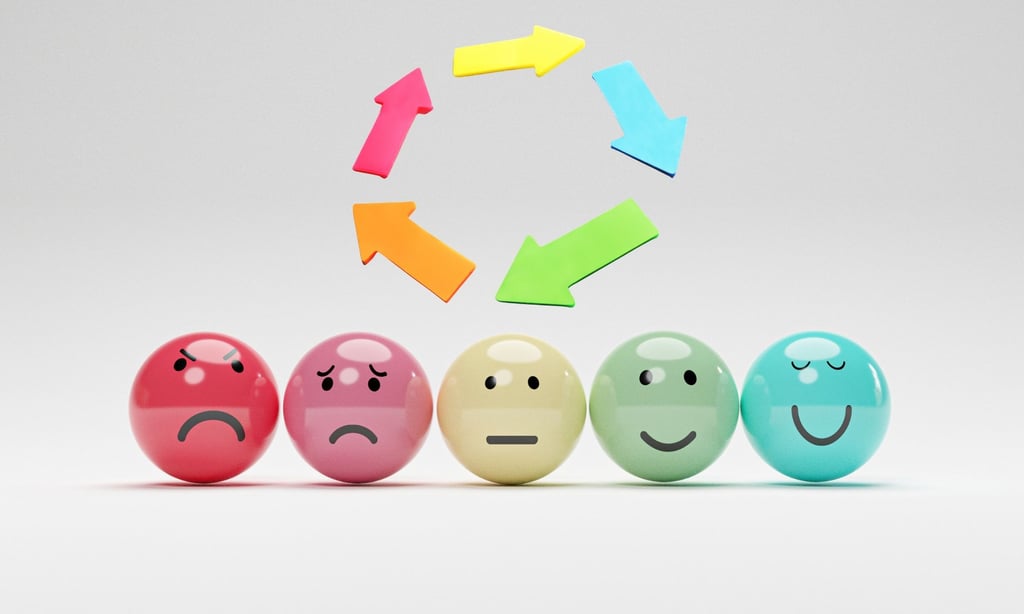Disrespect: Trauma Trained You to Accept It – Here’s How to Unlearn That Pattern
Understand how trauma shapes your view of disrespect. Find real tools to unlearn patterns and find more respect in daily life.
RELATIONSHIPS
Shari Smith
8/24/20259 min read
As an Amazon affiliate, we earn commissions at no extra cost to you if you click our links and make a purchase.


If you catch yourself putting up with disrespect—whether from a partner, at work, or even within your family—you might start to wonder why.
Maybe you ask yourself, “Why do I let this continue?” You might feel ashamed or frustrated, but the truth is, you’re not weak or broken.
You were taught, often by the same painful experiences, that this sort of behavior is normal.
The good news is you don’t have to keep accepting this as your reality.
With awareness and small steps, you can unlearn what trauma taught you about disrespect.
The Hidden Impact of Trauma on Tolerating Disrespect
Trauma shapes what you believe about yourself and how others get to treat you. When you experience regular invalidation, verbal abuse, or emotional neglect, your mind adapts.
You start thinking disrespect is just part of the price for love, attention, or even basic safety.
You’re not weak. You’re not broken. You’ve simply learned to see disrespect as normal. A history of trauma convinces you that your needs don’t matter as much.
In many cases, it tricks you into thinking you’re less valuable than others. It’s easy to feel like you’re living your life as an afterthought, or a footnote in everyone else’s story.
This shows up in how you interact with people every day:
You keep the peace, even when it means swallowing hurt feelings.
You quietly stay in relationships or jobs that drain you.
You accept behavior that leaves you feeling invisible or small.
Trauma’s core messages often sound like:
Your needs are less important than everyone else’s.
Love and acceptance depend on how much you’re willing to let slide.
Staying quiet and agreeable is safer than making waves.
There’s research to back this up. Studies show that people who go through long-term trauma adapt by lowering their expectations from others.
You start telling yourself that respect and kindness aren’t real needs – they’re luxuries. This is a survival move, not a flaw.
When standing up or asking for more gets met with conflict, your brain tries to keep you out of harm’s way by pushing you to play small.
The trickiest belief trauma can leave behind? That being mistreated is somehow your fault. It’s not.

Trauma Trained You to Accept Disrespect — Here’s How to Unlearn It
Watch Video...
When you were little, if the adults around you didn't show you respect or treat you with kindness, your heart learned that this was normal.
Maybe authority figures like parents, teachers, or other adults made you feel small or unimportant. This wasn't your fault, but it taught your mind that disrespectful behavior was just how people treat each other.
Now, as a woman, you might find yourself accepting disrespect in marriage when your partner talks down to you, or disrespect in the workplace when bosses or coworkers are mean or dismissive.
You deserve so much better than this. Your human dignity matters, and feeling disrespected all the time isn't something you should just put up with because it feels familiar.
The sad truth is that when we get used to a lack of respect, it hurts us in deep ways. It's a common source of anger that builds up inside, and the mental health consequences can make us feel sad, stressed, or worthless.
Think about how teacher burnout happens partly because of the disrespect of teachers—when people don't value what someone does, it wears them down.
The same thing happens to you when you face verbal disrespect or insulting or sarcastic comments day after day.
These experiences create power imbalances where you feel small and others seem more important, fostering division instead of the positive feelings and admiration and appreciation that healthy relationships should have.
You might feel confused about calling out bad treatment because you're not sure if you're overreacting or if what's happening is really wrong.
Here's what I want you to know: you can learn to change this pattern, and you're not being too sensitive when something feels wrong.
Building self-respect means understanding that treating others with kindness doesn't mean you have to accept unkind treatment back.
Showing respect to people is good, but it should go both ways.
Learning the difference between calling out (which can feel scary) and calling in (which means addressing problems gently but firmly) can help you stand up for yourself while still being the caring person you are.
Your social status or worth doesn't depend on how others treat you—you matter because you're you.
When you start expecting better treatment in your social interactions, you'll find that healthy relationships bring you joy and peace instead of constant worry about being disrespected or having to walk on eggshells around disrespecting others.
Strategies for Why Disrespect Can Feel Safe: The Paradox of Familiar Pain
It’s confusing, but your brain likes what’s familiar—even when it hurts.
Over time, if you grow up or live in environments where chaos and disrespect are common, your mind files that away as “normal.”
It’s almost like your nervous system relaxes in the face of chaos because it knows what to expect.
Does kindness or calm make you uneasy? Some people feel more comfortable needing to prove themselves than being greeted with open kindness.
You might even doubt or mistrust people who treat you well, thinking: “This can’t be real. When’s the other shoe going to drop?” That’s your trauma talking.
From a biological point of view, your brain is looking for patterns. If the pattern is disrespect, you end up searching for it—sometimes even where it doesn’t exist.
Safety can feel suspicious or even boring because you’re waiting for chaos to return.
This pattern leads you to sabotage healthy relationships—often without meaning to. You find it hard to relax into genuine care or kindness because your body expects things to go wrong.
It’s not a personal failing. It’s just how your survival system has been trained.
Try this mindset shift:
“This feels weird because it’s new, not because it’s wrong.”
Small Practices to Make Respect Feel Normal
Notice small acts of kindness without brushing them off.
Allow yourself to sit with the awkwardness when someone treats you well.
Practice staying in moments of stability—remind yourself it’s safe.
Build relationships with people who respect your space, even if it feels strange at first.
Healing your sense of normal starts by letting kindness sink in, bit by bit.
How Shame Fuels Silence and People-Pleasing
Shame is sneaky. It’s the feeling that pipes up whenever you try to stand up for yourself and whispers, “Who do you think you are?” Trauma ramps this up.
Maybe you grew up being told you’re too sensitive. Maybe speaking up in the past led to rejection, punishment, or being called dramatic.
Over time, you start believing it. You try to be the “easy” one. You don’t rock the boat. You even start thinking your feelings are a burden or that the problem is your sensitivity—not the disrespect itself.
You become exhausted from hiding your feelings, always trying to make everyone else comfortable. Shame wins when you believe that standing up for yourself is selfish. But it’s not. It’s healthy and necessary.
Here’s how you can start challenging the shame voice:
Notice when shame pops up. Pay attention when you hear that “stay quiet” message.
Question shame’s warnings. Ask: “Am I really being difficult, or just being honest?”
Practice advocating for yourself in small ways.
For example:
“That joke hurt my feelings.”
“I need space right now.”
“I’m not comfortable with that request.”
It’s not selfish to want basic respect. Real friends and healthy partners will adjust.
If someone refuses to respect your boundaries, notice that’s not your failure to be likable—it’s their inability to meet you there.
Breaking the Cycle: Why Working for Respect Doesn’t Work
If you grew up needing to earn love or tiptoe around someone’s moods, you likely picked up a belief that love and respect have to be earned.
This shows up as overworking yourself in relationships or at your job.
You give and give, hoping someone will finally notice and treat you right.
But here’s the truth: Love doesn’t have to be earned.
When you tie your worth to how others treat you, you end up drained and unseen. Chasing approval from someone who won’t give it is like filling a bucket with a hole in the bottom.
No matter how hard you try, it will never be enough.
Ask yourself:
Why am I working so hard for something that should come naturally?
How is constantly trying to win respect affecting my peace and my health?
You do not have to convince anyone to respect you. Your worth is not a debate. If someone only values you when you bend over backward, that’s a sign to reconsider the relationship.
Sometimes this means walking away from long-standing relationships or patterns, even if it’s tough. Letting go is not failure. It’s honoring your needs.
When you stop apologizing for wanting kindness, you start making space for healthier connections.
Setting Boundaries: The Best Self-Respect Tool
Setting boundaries is the most powerful thing you can do to protect your peace. Boundaries aren’t walls. They’re there to show what’s okay and what isn’t.
When you set limits, you’re telling yourself—loud and clear—that your needs matter.
But let’s be honest, setting boundaries is scary if you’re used to putting yourself last. You might worry people will call you demanding or dramatic. You may even feel guilty for needing space.
Simple boundary statements can look like:
“I can’t make it tonight.”
“That comment was hurtful.”
“Please don’t talk to me like that.”
There’s no need to over-explain. A clear, calm, and consistent approach is all it takes. Expect some pushback—especially from people who benefit from your lack of boundaries.
That discomfort is part of change. It means you are making your needs a priority, maybe for the first time.
Holding your limits can feel awkward, even frightening. But every time you set a boundary, you lay the groundwork for healthier relationships—first with yourself, then with others.
Checklist for Practicing Boundaries:
Identify where you feel discomfort or resentment.
Decide what your non-negotiables are.
Communicate your needs simply and without guilt.
Stay consistent, even if you feel pushback from others.
Allow yourself permission to change—your boundaries can grow with you.
Healthy boundaries invite respect. They make room for honesty, comfort, and true connection.
Five Ways to Handle People Who Don’t Respect You
Speak Up Calmly: State your needs without apologizing or getting defensive. Clearly say what’s not okay.
Set Firm Boundaries: Let them know the consequences if disrespect continues. Follow through as needed.
Limit How Much Time You Spend: Protect your energy by minimizing contact with people who ignore your boundaries.
Choose Where to Invest Your Energy: Focus on relationships and environments that treat you with honor.
Seek Support: Surround yourself with people who respect you and can encourage you when handling difficult situations.
These steps help reinforce your self-worth daily and teach others how to treat you.


Reclaiming Your Worth: From Surviving to Thriving
Relearning your worth after trauma isn’t a quick fix. It’s an ongoing process—a winding, sometimes uphill path.
The key is to remember: your value does not shrink based on how others treat you. You’re not fighting for scraps anymore. You’re building a new normal where being respected isn’t a reward but your baseline.
A big part of healing is catching yourself in old thought loops and swapping them out, slowly, for empowering beliefs. Challenge what you were taught.
Allow yourself to feel vulnerable without seeing it as a weakness. Vulnerability is strong, and setting boundaries is proof of how much you’ve grown.
Each time you hold a boundary, honor a need, or let yourself be valued, you’re making real change. Healthy, lasting love is not a performance; it’s about being seen, valued, and accepted as you are.
Whenever you feel overwhelmed, revisit the practices that help—notice acts of kindness, repeat your boundaries, and check in with supportive friends.
Healing will have messy days, but every small act of self-respect is a victory.
*You are allowed to take up space. You are worthy of respect.
You don’t need to earn it—it’s your right as a human being. Trust it. Stand by it. Build your life around it. You’ve got this.








